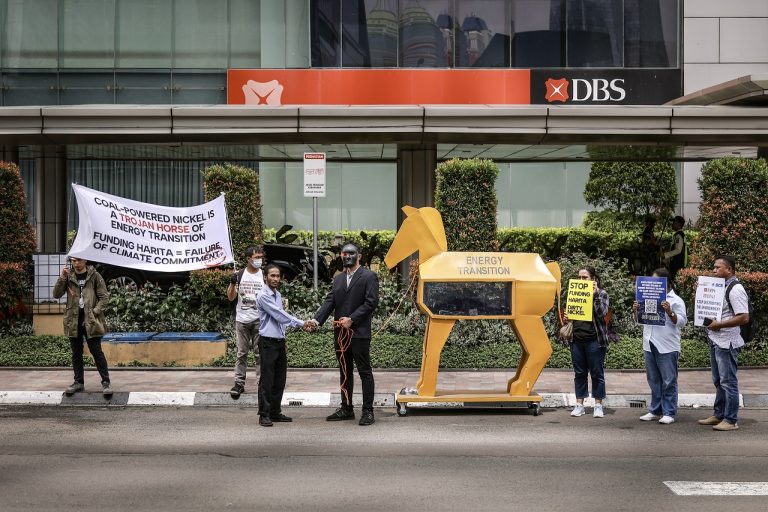Jakarta – A theatrical installation titled “Trojan Horse” was staged by a group of civil society organisations in front of the offices of several banks financing Harita Group’s nickel smelter on Obi Island, North Maluku, on Thursday, October 2. Through this action, activists urged national and regional banks to immediately cease funding nickel projects that are considered environmentally harmful and violate global climate commitments.
This activity was led by a coalition comprising Market Forces, Enter Nusantara, the Mining Advocacy Network (Jatam), and Trend Asia, and was attended by two priests from Obi Island.
“The Trojan horse is a symbol of how banks hide dirty energy funding behind the narrative of energy transition,” said Ginanjar Ariyasuta, Market Forces Campaigner.
Harita’s nickel smelter on Obi Island operates with a new captive power plant with a capacity of 890 MW, as well as an additional 1.2 GW that is still under construction. In fact, according to researchers’ records, current operations alone produce nearly 11 million tons of CO₂ per year—equivalent to almost 1% of Indonesia’s total emissions in 2023.
If expansion continues, that figure is expected to jump to 22.45 million tons of CO₂ emissions by 2028. “The construction of new coal-fired power plants clearly contradicts the Paris Agreement, which calls for limiting global warming to below 1.5 degrees,” said Ginanjar.
Criticism of lending banks
A number of major Southeast Asian banks—including OCBC, UOB, DBS, Maybank, and CIMB—have been accused of violating their own internal policies that state they will stop financing new coal-fired power plant projects.
“They continue to fund Harita’s smelter. This contradicts the sustainability commitments they have published,” said Ginanjar.
Ramadhan, Coordinator of Aksi Enter Nusantara, echoed this sentiment. He highlighted Bank Mandiri’s recent decision to disburse Rp3.1 trillion for Harita’s smelter project. “The science is clear: there should be no new coal-fired power plants if we want to keep the temperature rise below 1.5 degrees. Domestic banks must immediately stop supporting dirty energy,” he exclaimed.
Environmental and human rights impacts
In addition to climate issues, activists also raised concerns about the direct impact of Harita’s mine on Obi Island on local residents. Alfarhat, Jatam’s campaigner, said that mining operations had polluted residents’ water sources with dangerous levels of chromium-6 above safe limits, as well as causing the forced eviction of indigenous communities.
“Banks should not continue to be accomplices to companies that destroy local communities and the environment. Funding coal under the pretext of nickel for electric vehicle batteries is just a form of transition-washing. Coal remains the dirtiest fossil fuel, even when packaged with promises of clean energy,” Alfarhat asserted. (Hartatik)
Banner photo: A number of environmental activists staged a theatrical performance in the form of a “Trojan horse” installation organised by a group of civil society organisations in front of the office of the bank financing Harita Group’s nickel smelter on Thursday (2/10). (Source: Market Forces)















